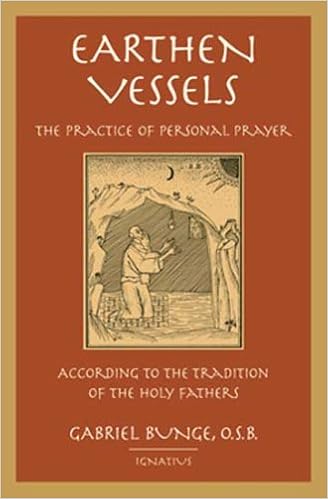But all of those are just symptoms. They're not the problem.
The problem is that we're not obeying the commandments. God told us that, if we followed Him, He would favor us with the signs, the unavoidable signs, that we are the Orthodox Faith. You see any mass signs of our favor with God like in the old days? Me neither. We're clearly not following the commandments.
God gave us three commandments: Love God with all your heart, soul, mind, and strength, and love your neighbor as yourself. He also gave a third commandment, a commandment reiterated throughout the New Testament: pray always. Always, always, always, pray! Love of God and neighbor and constant prayer, that's Christianity. How many of us are doing any of these three, really? Especially the last one, prayer, the mother of all virtues as the Fathers of our Catholic Orthodox faith call it. But how are we supposed to do this?
That's where Gabriel Bunge's book, Earthen Vessels, comes in. Father Gabriel Bunge is a Russian Orthodox monk (former Benedictine monk, for all you Catholics who are wary) wrote this excellent guide to prayer based upon the monks from Egypt such as Anthony the Great and their disciples such as Basil the Great, Evagrius, Origen, John Cassian, and Benedict. Bunge outlines the basics of what these monks, the ones who perfected our prayer tradition, did to attain such holiness.
Bunge first starts by outlining when the ideal times for prayer are. The monks of Egypt had three times (and Bunge makes it very clear these are not just for monks). Morning, evening/before bed, and during the night. These three times were considered a kickstart and sustainer for the rest of the prayer throughout the day. Bunge makes it clear that the prayer during the middle of the night needs to be done by everyone, although at different intensities for each person. Prayers are to surround basic aspects of human life, particularly eating and bathing. Fr. Bunge and the Fathers recommend an icon corner in a quiet place in the house, filled with icons, a Bible, a rosary, etc, and to always go to this place when you do your morning, evening, and night prayers.
While prayer may be about the mind talking with God the body must be involved as well, since we are incarnated souls. Bunge explains that all Christians, from the earliest times, prayed facing East. This was done for a number of reasons: the sun, source of all physical life on this earth, rises in the east and so we purposely associate the rising of the sun with the Second Coming of Christ, Eden was "in the East" and so we face our old home, hoping to get their some day, and Christ is said to come again from the East. Whatever reason sticks with you all Christians are to pray facing East. Lifting up your eyes while praying is something that the Fathers also did, imitating the psalms literally. This includes lifting up your hands in prayer in the orans stance. Bunge also covers the basic postures of prayer: standing (the default), kneeling (supplication, extreme sorrow), and sitting (to learn, to listen). He also covers bows, making the sign of the cross, and metanies (which, in the West, are genuflections).
Bunge then moves on to specify the three different "stages" of prayer: psalmody, prayer, and contemplation. Psalmody consists of reading the psalms aloud, using them as a springboard for prayer, raising your mind to God. Bunge comments that, while there's differing opinions on whether or not you should vocalize your prayer, you should not openly vocalize your prayers to God, since the demons are waiting in the wings to attack should they know what you're saying. In the case of psalmody Bunge recommends going through the entirey all the psalms, curses and imprecations included (which the Fatheres interpreted as curses against demons, not against men). Don't pick and choose at God's word, there's a time and place for all of it, curses and imprecations included! Contemplation is God actually showing up and being with you, which is only possible after you've worked through psalmody and prayer and getting rid of the passions so you can see Him. The goal is to receive God in all His glory and love. after all. That's the entire point of a prayer rule.
There's a lot more to the book, which you can find here on Amazon. I highly recommend it; this book changed my life in a powerful way and I can't recommend it highly enough for those of you who want a bit more of a map to walking with the Lord. Psalmody, prayer, and contemplation is something to strive for and Fr. Bunge provides a good road map for us all.

No comments:
Post a Comment